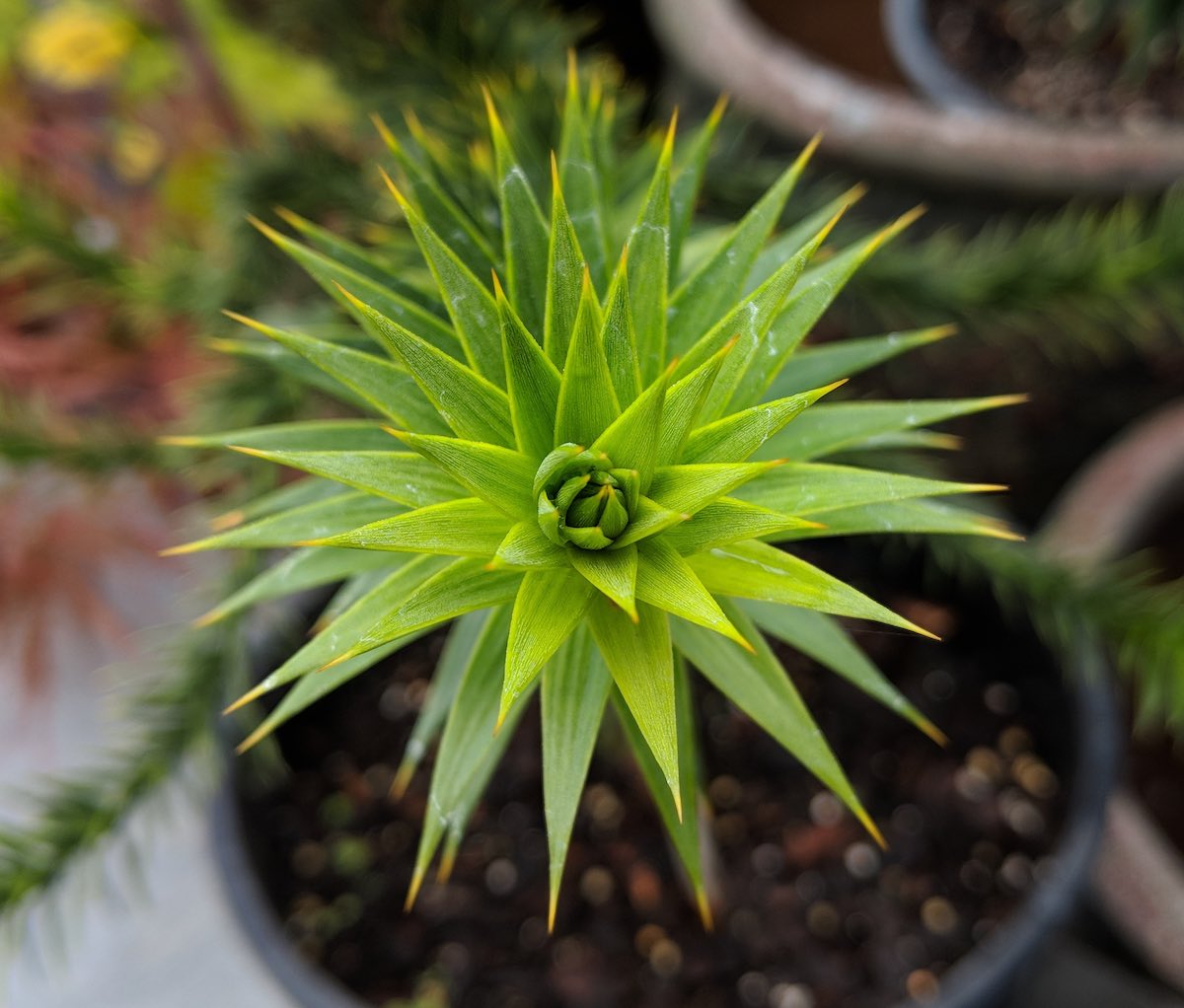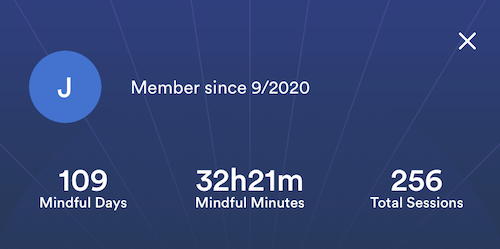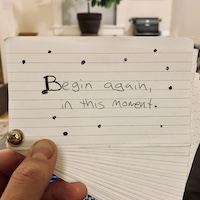👋 I'm curently looking for a new role. Hire me!
Have you ever asked yourself ...
What is a thought?
What does being aware feel like?
What is the context of your thinking?
Is there a self? What does having a self feel like?
Do you have free will?

For as long as I can remember, I've struggled with repetitive, mostly-negative thinking. I've heard this described as low entropy thinking, where your mind is following certain well-worn pathways instead of branching out and exploring new ones. This kind of orderly, predictable thinking is great for telling yourself that things always work out fine or that suffering is temporary. But when the pattern you're looking for is evidence of your incompetence and expectation of a disastrous future, this kind of predictability is agonizing.
I regularly find myself stuck in this well-worn pathway of thought and have for my whole life. It could last for few minutes or a few hours or it could stretch into days at a time. During these times by mind would be a tornado of self-talk. I would have endless conversations with myself where I would pick apart the choices I've made and things I've said, examine where I could have done better and what I'm not prepared for. I would make endless lists in my head and on paper and on my phone of things to do, amounting to more work than I could do in a year. Then, predictably, I would start to stress out about how much there was to get done, work that I had invented and committed to just minutes ago.
This state felt productive in a way, like the first step towards self-improvement or doing something great. If I wasn't finding flaws in every little thing I did, how would I grow as a husband and a dad? Or as an engineer? If I didn't find all the things to do and put them on a list, how would they get done? It rarely occurred to me how repetitive and cyclical the thoughts and tasks and phrases were.
This context has always been there, underlying everything I do. But when things get bad, it's so loud that I start to turn in on myself. Screen time, sugar, and IPA consumption goes up, focus at work, physical activity, and patience with everything and everyone around me goes down. People that know me well see this cycle happen routinely and might acknowledge it with a gentle "are you OK?" Everyone outside of my family and close group of friends, though, are surprised to hear me describe this experience. I might seem withdrawn on a work call or be less apt to ask a neighbor about their day but, even in the most extreme cases, I'm able to keep external impact to a minimum.
I was caught between wondering if this is just something I have to suffer through and feeling like I would do anything to get rid of it. Mental health problems on this level are notoriously hard to approach. Your pattern of thinking might be regularly causing you significant distress but unless you're hearing voices of the dead or hallucinating, you (and those around you) might dismiss the experience as "everyone feels anxiety." Which is, in fact, true. So how much anxiety are you expected to endure before you prioritize looking for a solution? It turns out, my answer was "the amount of anxiety caused by living through a global pandemic with kids."
Last September, through a random series of events, I found a meditation app called Waking Up. My "mindfulness practice" in the past, if you could call it that, was a number of misguided activities that would only be a part of my life for a short while before being forgotten. I tried listening to "sound bath" music like this while either struggling desperately to clear my mind for a half an hour or just following each thought thread intentionally. Turns out, clearing your mind forcefully of all thoughts is both impossible and uncomfortable; following each thought to wherever it leads is the opposite of being mindful. I also tried a different meditation app that concentrated on "body scanning" type meditation. I found the guidance and practice hokey and a completely uninspiring way to spend 30 minutes. I also tried just "being present" intentionally and that, well, give it a try and you'll see what it's like. For me, it was just one more thing to berate myself for not getting right.
All of these activities required me to use my willpower to do something with my mind. This kind of "just do it" mentality around mental (and physical) health has never been a path to lasting change for me. My desire for the outcome never seemed to be enough to suffer through the journey. In the case of mindfulness, it was even harder because I wasn't totally sure what the outcome was. Absolute happiness in all moments? A slightly increased feeling of well-being? More productive and focused? I knew what I wanted to be free of but there was no guarantee that the practice would get me there.
I didn't know it at the time but I needed an idea of where I was going and guidance around the specific things my mind was naturally doing to thwart focus. I had an instinct that mindfulness, in general, was what I needed and that meditation practice was probably what would get me there. It makes sense: if you're caught in thoughts you don't want to think while you're living your life, the solution is to pay more attention to living your life. But how? It turns out, what I needed was a coach and that's what I got from Waking Up.
I want to be careful not to sell Waking Up to you. While I recommend it fully and have been trying to get almost everyone I know to try it, the thing I'm actually trying to sell you on is mindfulness, generally, and a meditation practice specifically. The Waking Up app just happened to be the thing that helped me see the proverbial light through a number of important breakthroughs.
This app, through the words of its creator Sam Harris, did a brilliant job of illustrating what to expect from mindfulness while providing guidance for the stumbling blocks that probably happen to everyone trying out meditation for the first (or tenth) time. The introductory course, a set of 28 daily meditations lasting 10 minutes each, was simple and approachable and tackled a small component of the practice in each session. At certain points, it felt like the session was reading my brain waves by providing small encouragements at exactly the right time. Each session was long enough to gain some kind of insight but short enough that I never found myself checking how much was left (something I always did when I started with 30 minute sessions).
As I worked through the 280 minutes of content, I also started listening to short clips in the Theory section of the app, specifically under the "Fundamentals" category. I would listen to them while walking or doing the dishes or before bed at night. Similar to the introductory meditations, the words here felt so timely and personal, like they were picked for me.
So why meditate? The basic logic is quite simple. The quality of your mind determines the quality of your life ... changing how you respond to the world is often as good as changing the world ... You can look more closely at what you're doing with your own mind and actually cease to respond to life in ways that produce needless suffering for yourself and those around you.
Here are a few clips that were particularly insightful to me:
Hearing what I needed to hear while exploring the techniques that would get me there was a powerful combination. I had both a sense of what to expect along with an idea of what I would get there. But even more than that, the process of getting there was accessible and enjoyable in a way I have never experienced previously. All of this came together in the first month or two of practice and helped me understand my mind in a ways that I never could have expected.
The first major break-through for me was seeing thoughts for what they are: appearances in consciousness. Just like a sound or a sight or a smell, thoughts appear in your consciousness without any prompting or action on our part. We've all had the experience of reading a book and, at the end of a paragraph, coming to the realization that we were thinking about something else and have no recollection of what that paragraph was about. That's the feeling of your awareness switching from your vision, processing symbols into language, to a thought.
During meditation, the same thing happens. You're focusing on your breathing, following your chest going up and down, and then suddenly you're off somewhere else making a grocery list or planning out your work day. If you're not familiar with mindfulness (or you are and you just forget about it), this thought either leads to another thought and another and another or you have kind of a facepalm moment and force yourself back to what you were doing.
It turns out that thoughts are things that can be examined if you learn how to pause when they appear. For me, discreet thoughts are typically an image or two combined with A LOT of words. I found that I could describe a thought to myself, the exact images and words that were coming through, like I could with any other thing that I experience. I walk back through the images I saw and conjure up the words I heard as a way to become aware of the thought. What I found, quite quickly, is that the thought itself dissolves, replaced by your meta-thinking about that thought. Now you're examining what's going on in your mind instead of just following the thought.

If you have not tried any formal meditation practice of this type, the last 3 paragraphs might be completely baffling to you. I would have had this same experience before starting my practice and that's to be expected. It's not common for people to examine how their mind functions in this way without being clued into the fact that it's possible.
Practicing this act of beginning again, of looking at your thoughts directly instead of just following the thoughts themselves or forcing them out is the true crux of a meditation practice. You might start a 10 minute session and find yourself coming back to your breath over and over and over and think "this is insane, my mind is not made for this." But one of those times you might listen to Sam say something like ...
If you find yourself lost in thought, become aware of the thought itself. Observe the thought and then let it pass. Where does it go?
... and give it a try. Just once in the whole ten minutes. And you might find that you too can "see" what that thought consisted of, what images you brought forth and what words you were saying to yourself. You might be able to recreate a whole part of that thought, almost exactly how it played out in your mind.
That's how it all started for me, these little acts of observation, a few seconds during each session that started adding up. It became more and more clear that the cycle of being unconsciously pulled into thinking, realizing that I'm there, quite literally waking up and looking around as though I just became lucid in a dream, and then coming back to the practice is, in fact, the practice. The more you walk through this process, the more effective the practice is. The exact thing that I was beating myself up for previously, thinking and then having to return to what I was meditating on, was exactly what I was supposed to be doing without realizing it!
That was another important break-through for me, that meditation is not about discovering some state and then training yourself to achieve that state over and over again. I found, in the beginning, that sitting there without thinking was a strange experience. Without some kind of distraction, it felt like my mind was a little rabbit in the forest and there were thoughts at every turn, threatening to pounce at any moment. I would find this "state" of not thinking and try to hold on to it desperately, my brain white-knuckled with effort. This effort would always come with a fresh wave of shame or another negative feeling, that all-too-familiar message of "you're doing this wrong ... again."
I have since learned to recognize that feeling and realize that, in the times where I'm struggling against this blizzard of thoughts, I'm doing something far more difficult than just allowing the thoughts and then recognizing what I'm thinking about. I take a big breath and just let the thoughts come, examining each one as they appear. It might take a minute to get back to what I was meditating on (the "meditation object") but I now know that this is not wasted time. What initially felt like a state of mind that required great effort to maintain for an arduous 10 minutes now feels like the true, natural starting point of my mind, the root and context of my whole experience.
The observance of thoughts for what they are and the growing familiarity with this place of rest within my mind generated a strong curiosity of how my mind works. It took over 4 decades to finally see how my mind was functioning in every moment. I am not changing anything, I am seeing clearly the mechanics and it is, without hyperbole, a revelation. All this time I had been trying to force myself to think a certain way or stop feeling a certain thing without understanding what a thought was or how I was experiencing a feeling. The freedom I was hoping for was not found in control, it was found in knowledge.
This growing curiosity became a strong motivation to continue my practice. I have explored my motivation for positive personal change before and know that, for myself, the outcomes have never been enough to push me through a boring and repetitive practice. If I was going to do something, I had to enjoy at least some part of the process. The enjoyment of meditation began to come from the discoveries and connections that I was discovering on a regular basis. If I started to find a particular meditation session boring, it would become clear to me that I wasn't paying attention to the practice itself. Beginning again and recommitting to what I was doing for a measly 6 more minutes was an easy choice to make.

At the same time that I was exploring the inner workings of my mind for 10-20 minutes per day, I was noticing the effects that this shift was having on my life outside of the practice. I have a hard time putting this change on any kind of "enlightenment" spectrum but I had experienced and accepted new truths about my experience during meditation and so, naturally, how I interact with the world had to change.
I found that the same techniques I used with my thoughts in meditation worked just as well when I wasn't meditating. The same thoughts that could capture me for minutes or hours were now gone in seconds. I no longer felt at the whim of what appeared in my mind. I couldn't control what appeared but I could recognize the image and words that went along with it and calmly wait for it to depart before it started a cycle of thought. It became easier and easier to realize when I was perpetuating anger or anxiety or fear through a looping series of images and words appearing in my mind.
This, along with specific guidance in the app, helped me to start noticing emotions as physical sensations. These sensations are the things that I don't have conscious control over, they just appear in response to stimuli. I began to recognize things like my tendency to hold my breath or to breath very shallowly when I'm feeling strong anxiety. I noticed radiating waves of warm tingling out to my extremities when I was getting angry. I noticed a sinking, negative space in my gut when anxiety kicked in.
The ability to break free from cycles of negative thinking and recognize when I'm having a somatic response to a situation out of my control felt like an absolute revelation to me. The thoughts still come and the emotions are still triggered but it is now a truth, by way of my experience, that thoughts and emotions that last past a few seconds are doing so because I allow them to or, in some cases, will them to by focusing on the exteranl event that initially caused it. Negative emotions and thoughts still appear, that's out of my control, but their stickiness is a matter of will.
The last 5 months, despite still riding out this Groundhog Day existence of weathering a pandemic with young children, have been a different internal experience than any other I can remember. The physical experience of anxiety - a knot in my stomach, shallow breathing, eyes cast perpetually down - is now as recognizable as hunger to me. Low entropy thoughts and series of thoughts can be examined for the images and self-talk that they are. I can recognize when these things are happening in tandem and notice the condition where I find myself noticing over and over. That "state" means I need to pause for 10 minutes or go for a walk or do something else that can capture my focus.
According to the app, I've put in almost 33 hours of mindfulness since September. I try to practice daily, though I make an effort not to treat it like a "streak" or an accomplishment. I do it because it's enjoyable and it reminds me of how I want to live, not just because I did it yesterday.

What started out as a strategy for coping with anxiety has evolved into an important set of philosophical questions about my existence on the planet as a human being. A few of those questions are the ones at the top of this post, questions that might have felt frivolous at worst or amusing at best less than a year ago. These now feel like some of the most important things to explore for ourselves, both for our mental well-being as well as compassionate interaction with all the other conscious beings around us.
But I don't think I'm ready to start writing about all that quite yet.
If you made it this far, thank you sincerely. This has been an immense and important personal journey, one that I feel compelled to share with anyone who wants to listen. If you are just getting started, here are a few strategies that might help you to enjoy and continue in your practice:
- There are some days where focusing on the practice are easier than others. The days that are harder are just as important as the days that are easier. If you have to pull yourself out of thinking 20 times in 10 minutes instead of 5, see that as 15 more reps of exercise rather than 15 failures.
- Listen closely to the guidance within the app and use that to pull yourself back to the practice. Even if you keep following thoughts, the object of the practice (like "follow your breath" or "examine your visual field") can give you a helping hand in coming back.
- Treat the little voice that's telling you "you're meditating wrong; you suck at this" as just one more thing in consciousness that you can examine like a sound or a tingle in your body.
< Take Action >
Comment via:
Subscribe via:
< Read More >
Tags
Newer

Mar 06, 2021
Cards to Live By
A little system I use to remember what's important to focus on during the day.
Older

Dec 31, 2020
Protect your WordPress REST API with OAuth 2 using Auth0
In this post, we are going to add the ability to use Auth0-generated access tokens for WP REST API endpoints that require an account and certain capabilities.